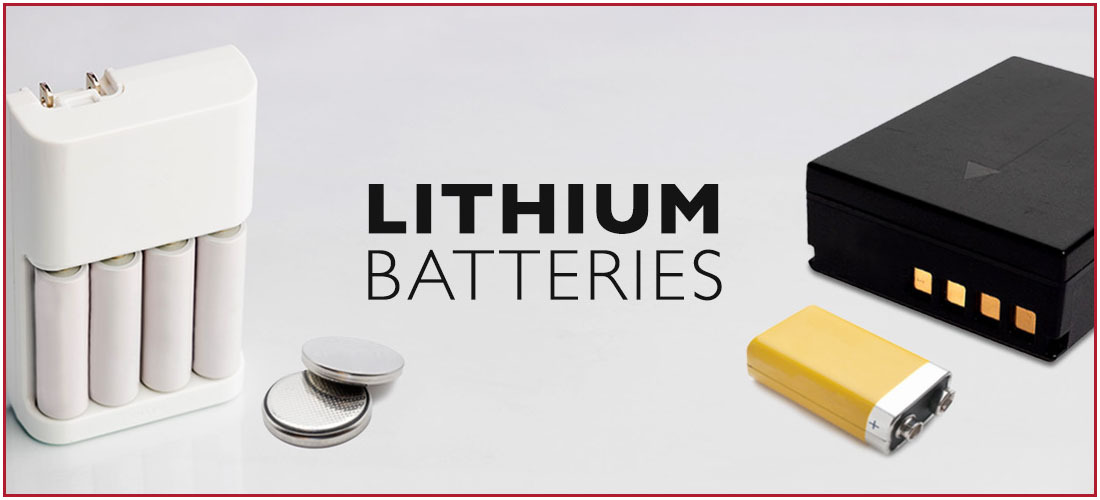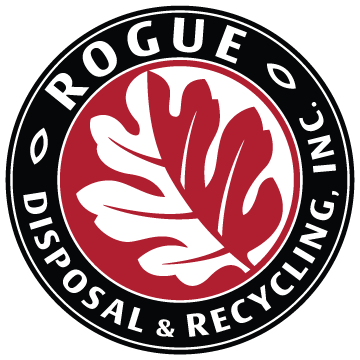Understanding the benefits — and dangers — of lithium batteries

Lithium and lithium-ion (or Li-ion) batteries are commonly used to power computers, cell phones, digital cameras, watches and other electronic devices. Lithium-ion batteries are often rechargeable (like the battery in your iPhone, laptop or Nintendo Switch, for example), while regular lithium batteries are usually single-use (like the batteries in toys, remote controls and smoke detectors). Unlike alkaline batteries, lithium batteries are reactive and contain hazardous materials. Because of this, you should never put them in your trash or recycling carts.
Odds are you may have a number of lithium batteries in your house right now and you may not even realize it. Lithium-ion batteries are the most popular and common type of rechargeable batteries. You’ll find these powerful batteries in virtually every type of personal electronics. You’ll also find them in all types of rechargeable power tools, including cordless drills, saws, routers, grinders and sanders (to name a few), as well as cordless garden tools, such as hedge-trimmers, leaf-blowers and edge-trimmers. And larger versions of these lithium-ion batteries power plug-in hybrids and all-electric vehicles of all types, including cars, trucks, motorcycles, buses — even the Mars Curiosity rover.
Button-cell, coin and any single-use lithium batteries are also made of lithium metal. These batteries are commonly used in products such as watches, hearing aids, keyless car remotes, medical devices, calculators and even greeting cards.
While these batteries are great at providing at-the-ready power for so many useful things, they present a real danger when improperly disposed of. Here’s some information about lithium batteries — including how to identify them and how to safely dispose of them when their lifespan is over.
Identifying different types of lithium batteries
There are three main types of lithium batteries. Here’s a look at each type, along with their key uses and precautions for handling.
1. Button-Cell or Coin Lithium Batteries
These small, round batteries look like coins, thus their name. Historically, these batteries have contained heavy metals as their main component. Today, the majority of these batteries are made from lightweight lithium. You’ll find button-cell or coin lithium batteries in hearing aids, keyless remotes, medical devices, watches, electronic votives and other battery-operated items where space is at a premium. Because of their small size, they can be a potential swallowing hazard and should be stored out of the reach of young children.
- Handling precautions: Place each battery in a separate plastic bag or place non-conductive tape (like electrical tape, preferably) over the entire button. If the terminal ends touch, lithium batteries can spark and cause a fire. Never put button-cell or coin lithium batteries in your trash or recycling carts.
2. Single-Use Lithium Batteries — and how to identify them
These common batteries often look like their alkaline counterparts, but are clearly marked as “lithium” or “lithium-ion.” Some types of single-use lithium batteries come in specialized shapes for specific equipment, such as some types of cameras and calculators. You’ll find single-use lithium batteries in everything from cameras and watches to remote controls, handheld games and smoke detectors.
- Handling Precautions: Place each battery in a separate plastic bag or place non-conductive tape over the terminal. If the terminal ends touch, lithium batteries can spark and cause a fire. Never put single-use lithium batteries in the trash or recycling cart.
3. Lithium-Ion (Li-ion) Rechargeable Batteries
These popular rechargeable batteries are found in cell phones, power tools, tablets, laptops, e-readers, digital cameras and other personal electronic devices. Some lithium-ion batteries are easily removed (just like alkaline batteries), while others are not easily removed from the product they’re part of, and can become a fire hazard if they are bent, broken or crushed.
- Handling precautions: For removable lithium-ion batteries, place each battery in a separate plastic bag or place non-conductive tape over the terminal. If the terminal ends touch, lithium batteries can spark and cause a fire. If it’s a non-removable lithium-ion battery, carefully store the item until you can take it in for proper disposal. Never put lithium-ion removable or non-removable batteries in the trash or recycling cart.
Storing lithium batteries
Never store any lithium or lithium-ion batteries where the terminals are touching or anywhere they can come in contact with metal objects, such as coins or keys. This can create a dangerous fire hazard. If you have larger quantities of lithium batteries outside of their original packaging, store them in a separate containment area away from your home or business to prevent property loss in the event of a reaction or fire.
And if you have a product with a lithium battery that is not intended to be replaceable (such as a cell phone or laptop), do not try and remove the battery. That battery may be glued to the product, and forced removal could result in an immediate fire or explosion. If the battery is in a silver-colored, cellophane-type bag or hard-plastic casing within the product, tearing or puncturing the bag or crushing the case could result in an immediate fire or explosion.
Many devices with embedded, non-removable batteries can be dropped off for recycling at our Transfer Station. Most locations of BatteriesPlus also accept lithium-ion batteries and small electronics for recycling (fees may apply). You can also learn more about Oregon's statewide E-Cycles program here, as well as finding various sites statewide to recycle your batteries.
Safely disposing of your old lithium batteries
Lithium batteries — and electronic devices containing lithium batteries — should never go into your household garbage or recycling cart. If they become damaged or crushed, they create a serious fire hazard. In fact, according to the solid waste industry publication Waste 360, lithium-ion battery fires cost waste, recycling and scrap operators more than $1.2 billion each year — not to mention serious injuries and even deaths for the people operating these facilities.
So what should you do with old lithium batteries? Here in southern Oregon, bring them to Rogue Disposal & Recycling’s yearly Household Hazardous Waste event held each May. Some retailers — including Best Buy, Home Depot, Lowe’s and Staples — also accept certain types of lithium-ion batteries for disposal. (Check the company websites for details.) And two different online resource databases — Earth911 and Call2Recycle — show you the names and addresses of lithium-ion battery drop off sites in your area.
When storing spent lithium batteries or bringing them in for proper disposal, the Environmental Protection Agency (EPA) recommends taping the battery terminals or connections with non-conductive tape, such as electrical tape or any adhesive tape not made of metallic material. Placing each battery in its own plastic bag also isolates the terminals and makes them safe to transport for disposal.
Remember, lithium and lithium-ion batteries never go in the trash or recycling and must be properly disposed of.
Another great resource is: batterysafetynow.org
Share This
